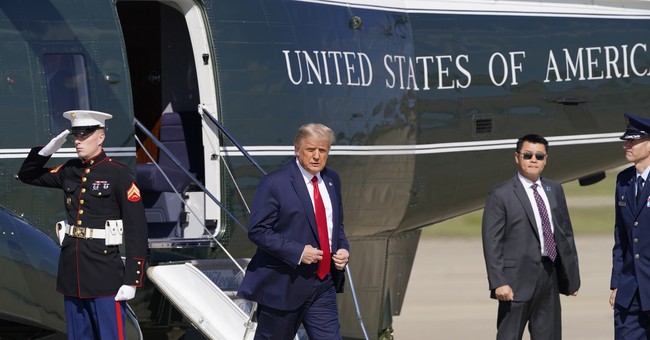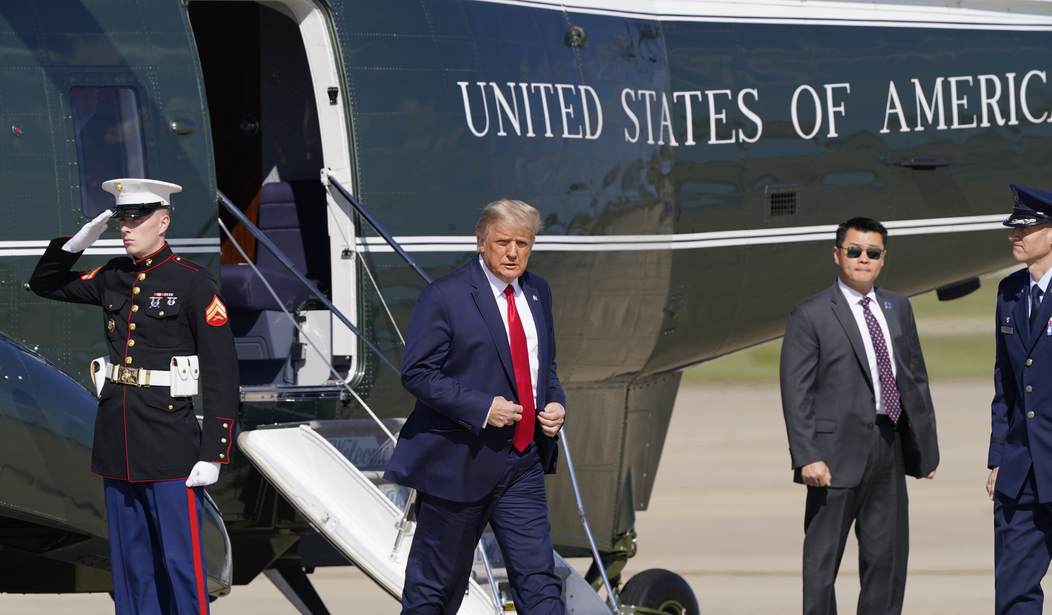
I think all of us amateur political prognosticators tend to over-inflate the significance of politics into the lives of ordinary Americans, and Twitter or politically-oriented websites like Red State or Vox amplify politics to levels beyond what it actually represents to most of the country. There are vast swaths of Twitter and Facebook that are populated by folks who do not spend 30 seconds of their day thinking about Joe Biden or Donald Trump.
Because that is reality, the idea that one particular election represents a “turning point” in American democracy, or freedom and liberty are at stake on Nov. 3, reflects the narrower worldview we inhabit here, and maybe not a wider worldview of folks who spend more time in their garden every day than watching Sean Hannity or Rachel Maddow.
In that context, I began to think about November 3 without the level of hysteria attached to it by various politically interested groups and organizations — starting with the media.
If every election did not represent an existential threat to humanity, they would be more mundane and less worthy of the 24/7 news cycle that the modern connected world has created. Billions of dollars are earned every election cycle as a result of the hype and hysteria.
So, let us assume for the moment that 2020 is not an existential threat to humanity — that it only seems that way because that’s what the political media does to generate revenue.
Instead, Donald Trump is just a polarizing President who has wider “extremes” in terms of people who love him and people who hate him. But in most other respects the election of 2020 is not meaningfully different than other incumbent re-election campaigns such as 2012, 2004, 1996, 1992, 1984, 1972, 1956, 1948, and 1936. Things get a little squirrelly farther back than that with Coolidge’s decision to not seek a second full term, Harding dying in office, and Wilson getting re-elected on a margin of only 3000 votes in California in 1916 when everyone expected him to lose.
So, let us turn to these re-election contests over the past 100 years, and then evaluate the 2020 contest using them as a backdrop.
2012 — Pres. Obama ran as a personally popular candidate for re-election, but his policy choices in this first two years in office ended with the wholesale destruction of the Democrat Party in Congress in 2010. Much like Pres. Trump, he was fortunate to be matched with a weak GOP nominee in Mitt Romney, who was not universally admired across the GOP as Obama was across the Democrat Party. Romney was unable to unite the party in the effort to take back the White House. Obama’s first term included a significant crawl back from an economic recession following the collapse of the housing market from the sub-prime mortgage crisis in 2008. Obama won re-election easily, 332 to 206.
2004 — Early in his first term Pres. Bush was a very popular wartime President. But by the time the 2004 re-election rolled around there two significant wars being fought simultaneously, and significant questions being raised in the press and by political opponents about the events that led to the war in Iraq. He enjoyed a strong economy in 2004, but faced a seemingly attractive and popular opponent in John Kerry. But Kerry’s level of popularity was over-estimated in a very Democrat friendly NY-DC press, and Bush won re-election 286-251, carrying 31 states.
1996 — Pres. Clinton enjoyed significant personal popularity, but much like Barack Obama, his policy decisions during his first term cost him greatly in the congressional midterm elections, with the GOP taking over the House Majority in 1994 for the first time in 40 years. Clinton moderated his politics following those devastating defeats, and began focusing on “small bore” political issues of lesser significance where he could reach compromise agreements with the GOP Congress which needed to prove that they could lead as the Majority. Clinton — much like Obama and Trump — was blessed with a weak GOP opponent in 1996, as Bob Dole represented a step back in time generationally from where the election of Clinton had taken the country. Clinton was also in the middle of a significant economic prosperity brought on largely by the “peace dividend” realized from reduced defense spending in the aftermath of the collapse of the Soviet Union. Clinton won re-election easily, 379-159.
1992 –Yes, this was a re-election year, but the incumbent, George H.W Bush, ended up losing his bid for re-election — the last sitting President to do so. But the outcome has significant contributing factors, including a generational change that was reflected in the candidacy of Bill Clinton, the first “Baby Boomer” to run for President after the WWII “Greatest Generation.” Bill Clinton had significant political skills and was a formidable challenger when he realized the race could be won, even thought he originally entered the race as a “test run” while eyeing 1996. Pres. Bush suffered at the hands of an old Texas nemesis, H.Ross Perot who ran a third-party candidacy that was able to gain traction because of his willingness to spend large amounts of his personal wealth to compete. But what hurt worse than Perot was the fact that the country was in an economic recession at the time of the election, which had been brought on by the Savings & Loan Crisis of 1990. In addition, the collapse of the Soviet Union took away the primary strength of George Bush as President — his lifetime of foreign policy experience in Washington as CIA Director, and later as Vice President to Ronald Reagan during the height of the Cold War with the Soviets. Bush lost decisively to a strong opponent in a time of economic difficulty, 370-168. But he lost in the popular vote by only 6 million votes to Clinton, while Ross Perot received almost 20 million votes as a third-party candidate.
1984 — Ronald Reagan was a transformational candidate for the modern GOP when he won the Presidency in 1980. Walter Mondale was merely a sacrificial lamb in 1984, losing 49 states, and 525-13 in electoral votes.
1980 — Jimmy Carter was a bad politician and a bad President, but a decent man. His economic policies led to 18% interest rates and double-digit inflation. He was not popular enough in his own party to forestall a primary challenge from the left. It added to his misfortune that he had to face the GOP’s transformational candidate for President, Ronald Reagan. Bad economy, intra-party primary challenge, and an extremely strong opponent are a combination that is hard for an incumbent to win re-election running against. Carter lost 489-49. As the incumbent seeking re-election, he carried only his home state of Georgia, his running mate’s home state of Minnesota, Maryland, and West Virginia.
1972 — Richard Nixon was not a beloved President, but the economy was in decent shape in 1972, and the Democrat Party blessed Nixon with a terribly weak opponent in George McGovern. Nixon cruised to victory, 521-17.
1956 — Iconic World War II hero Dwight Eisenhower won re-election after four relatively uneventful years. The economy was strong and growing, and the Democrats did him the favor of nominating Adlai Stevenson to run against him again, even though he had beat Stevenson for President 442 to 82 in 1952. In 1956 he beat Stevenson again, 457 to 73.
1948 — I consider 1948 a re-election since Harry Truman had served out three years of Roosevelt’s term after he died in office, and he led a divided Democrat Party which was beginning to fracture over a civil rights plank that Truman added to the Party’s platform. The election ended up as a three-way contest with Strom Thurmond running as a “Dixiecrat”. Thomas Dewey ran a conservative campaign and expected to win as a result of the split in the Democrat Party. But Truman had a positive campaign message, the country was enjoying a post-WWII economic expansion, and Dewey ran an uninspired campaign expecting to win. Final result 303-189-39.
Roosevelt ran for re-election, winning each time, in 1936 and 1940.
Hoover lost his bid for re-election to Roosevelt in 1932 largely as a result of the impact of the Great Recession which had begun following the 1929 stock market crash.
The upshot of this brief historical overview is that incumbent Presidents have rarely lost their re-election efforts, and when they did, the circumstances generally included poor economic conditions (Hoover, Carter, and Bush 41), combined with facing a very strong opponent (Hoover/Roosevelt, Carter/Reagan, Bush 41/Clinton).
We are currently facing very challenging economic times, but they are the result of external factors, not the policies of the Trump administration. The economic policies of the Trump administration produced some of the best economic times ever.
And Joe Biden is among the worst challengers ever to face-off against an incumbent President. He’s nowhere close to the political actors that Roosevelt, Reagan, and Clinton were.
While Pres. Trump is polarizing, he’s not unpopular in his own party the way Carter was, and to a lesser degree Pres. Bush 41. Pres. Trump did not face a challenge from inside his own party like Carter did, nor does he have to deal with a significant Third Party candidate like Pres. Bush 41 did.
Setting aside the hysteria caused by the political press, this election has none of the historical earmarks of prior re-election efforts where the incumbent lost.














Join the conversation as a VIP Member